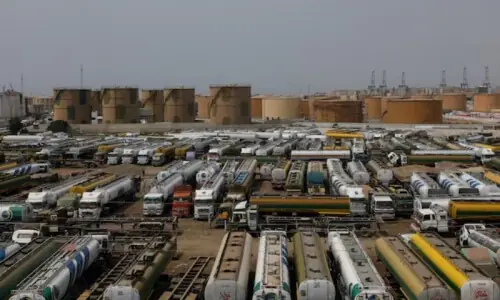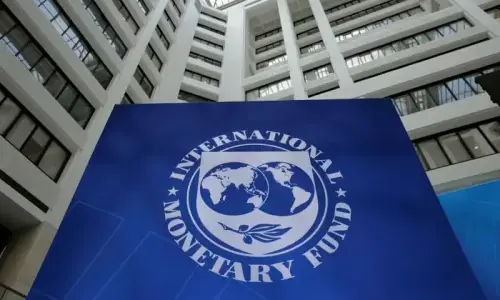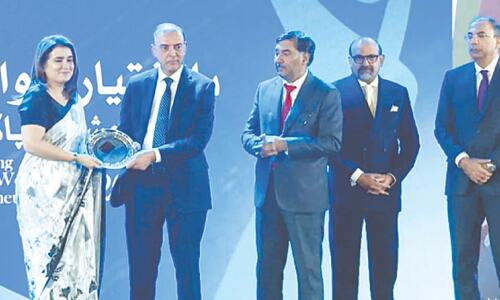Pakistan is in reality not an agrarian economy if one goes by the fact that agriculture’s contribution to our GDP currently stands at 18.5 per cent from a peak of 25pc. Of this livestock contributes 11pc. The major and minor crops are only 6.5 pc. On the other hand, agriculture and agri-related services employ 39pc of our workforce.
Of the 78.6 million hectares that Pakistan is made of, 22m hectares are under cultivation. There are 25m farms in Pakistan with an average holding of 6.5 acres. About 50pc are owner-operated. Agriculture also consumes 90pc of our water resources. An alarming number given that we have been declared a water scare country. While Pakistan is counted in the top 10 producers in the world of wheat, cotton, sugar cane, mangoes, dates, rice and kinnow, our food import bill this year will be about $8 billion. This is bound to increase if we are not able to increase our productivity and yield. In yield per acre and litre milk per cows/buffaloes, we are significantly behind South-East Asia.
We need to harness the tech solutions available to us to improve yields and productivity thereby improving the farmers’ income. Every intervention we make has to be from the farmers’ lens and must lead to an improvement in their living standards.
Data-driven agriculture must become the standard. We need to map the 25m farms, as well as the farmers managing these farms. There are as many as 190,000 data points per farm per day. However, even if we start with 60 data points, such as acreage, type of crop, type of fertiliser, seed, pesticide, soil composition, temperature, rain and humidity, we will be able to build the profile we need to forecast trends, provide advisory for crops, input and timing of sowing/harvest.
The use of drone tech to measure crop yields, spray pesticides, and monitor damage is yet to be scaled though it only costs Rs600 to spray pesticides over an acre that not only reduces hard labour but can also improve yield by up to 35pc
This data, combined with farmers’ profiles, can also be used for artificial intelligence/big data tools to create a credit score card, which should provide much-needed working capital the small farmers need.
The next big need is credit. Although under the State Bank of Pakistan programme of directed credit, commercial banks do lend to the agri sector, the lending is largely passbook or collateral-based. Data-driven lending does not exist and exposure to the small farmer is also sparse. The end game has to be to not just provide credit but also advisory, quality inputs as well as an end buyer.
The ideal intervention should start with soil analysis, weather conditions and appropriate crop selection and timing. Quality inputs provided on credit, monitoring prior to harvest via satellite, spraying through drones and the advance purchase of harvest with the ability of both dry and cold storage would be the ideal.
Information is the other railroad that needs to be leveraged. Pakistan has 90pc GSM (global system for mobile communications) coverage and over 90m unique cell phone holders. The bulk of low-income farmers use a feature phone as opposed to a smartphone. Radio programs with gamified agriculture information would be the ideal medium. The use of the USSD (unstructured, supplementary service data) medium should also be leveraged to provide additional financial services to this segment.
The use of drone tech to measure crop yields, spray pesticides, and monitor damage is yet to be scaled though it only costs Rs600 to spray pesticides over an acre. This not only reduces hard labour but also can improve yield by up to 35pc. Pakistan lacks basic agriculture research. We need to create more agriculture graduates. We also need to introduce agriculture biotech for alternate proteins and yield enhancement.
The value of the supply chain cannot be underestimated. The upstream supply chain of inputs and credit providers has already been discussed and there is some traction in the industry. What is missing is the downstream supply chain. The farmer is vulnerable once the harvest takes place. He does not have the holding power.
Interventions are needed to provide the ability to either buy the produce in advance or provide the ability to provide storage. With the Electronic Warehouse receipt regulations, the need now exists to build warehouses to house the produce and provide immediate liquidity to farmers.
Insurance can also play a major role. Climate change is playing havoc with the agri industry. Heat days have increased while rain days have decreased. Weather insurance is a must to reduce this uncertainty. Credit default and livestock cover must also be enhanced. The use of drone tech can reduce weather insurance premiums.
Pakistan has the potential of not only meeting its increasing food demand but also becoming a regional breadbasket. Focus on agriculture will not only eliminate the $8bn food import bill but also provide foreign exchange and reduce the rural poverty level. The use of data-driven agriculture will lead to yield and productivity enhancement and better use of our scarce water resources.
The writer is a tech entrepreneur and the Chairman of the Pakistan Fintech Network
Published in Dawn, The Business and Finance Weekly, May 2nd, 2022


































